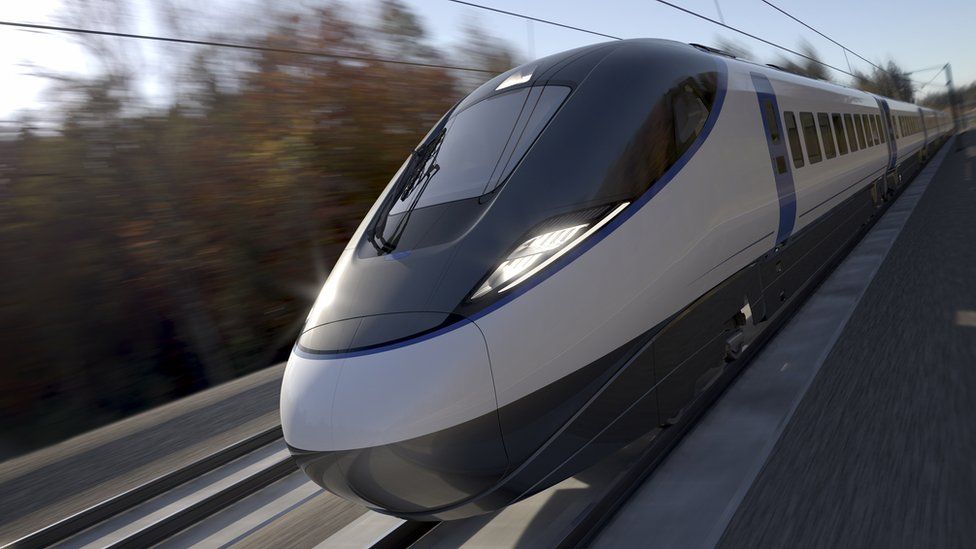ARTICLE AD BOX
 Image source, HS2
Image source, HS2
By Katy Austin & Tom Espiner
BBC News
The London to Birmingham stretch of the HS2 railway could cost more than £65bn in current prices, the boss of the company building it has said.
Sir Jonathan Thompson said a rise in the cost of materials such as concrete and steel over the past few years have added £8bn to £10bn.
In October the government cancelled the sections between the West Midlands, Manchester, and the East Midlands.
Now HS2 Ltd and the government disagree on the cost of building the rest.
The company's latest estimate for the London to Birmingham stretch is between £49bn and £56.6bn in 2019 prices.
The government thinks it should be delivered at the lower end of £45bn to £54bn.
However, Sir Jonathan does not believe £45bn is possible.
He said the budget was too low to begin with.
"The cost of delivery is more than the government budgeted, and that is before you begin to account for the extraordinary construction inflation over the last three years or so."
The firm's executive chair said HS2's costs had risen so much over the past decade because of poor cost estimating, changes to the project's scope, some poor delivery and the impact of inflation. He added that decisions to delay parts of the project for cashflow reasons, could end up meaning they cost more, and that the Covid pandemic had added £500m to £600m. Sir Jonathan also said HS2 trains will travel more slowly than existing Pendolino trains when they travel on conventional tracks between Birmingham and Manchester, because they cannot tilt on bends.
He said he expects fewer seats to be available on HS2 now the legs to Manchester and Crewe have been scrapped, due to trains having to be shorter. HS2 trains of the same length as the current Pendolinos would be used, but would have fewer seats. Sir Jonathan also said HS2 was waiting for the government to make decisions on certain aspects of the project, including the tunnel south from Old Oak Common to Euston.
Development of the railway's terminus at London Euston will depend on investment from private developers, with plans to develop housing around the station.
The site for a station at Euston has already been cleared, with residents and businesses forced out.
Until the new station is built, HS2 will end at Old Oak Common in West London, meaning people would have to change trains to reach the capital's heart.
The government has said there has been interest from developers.
However, in a BBC interview in November, the transport secretary, Mark Harper, would not say how soon he wanted to have a firm commitment from investors, or a new station design - arguing that an "artificial deadline" could damage the government's negotiating hand.
Mr Harper also could not say whether the tunnel taking trains from Old Oak Common to Euston would be paid for by private investors or the taxpayer.
He told the BBC that this would depend on "how much private sector money we can get in", and he wanted to "get the possible deal for taxpayers".
He maintained that bringing in the private sector would help the scheme be delivered on time and budget.
The government claims getting private investors to pay for Euston will save £6.5bn.
Mr Harper told the BBC this figure had been reached by converting the £4.8bn cost of the latest 10-platform station design into 2023 prices.
But ministers had already said that design was unaffordable.
Work on Euston was paused in March 2023, with the time to be used for developing an "affordable and deliverable station design".
In November, HS2 Ltd confirmed it would continue the process of buying more than 200 homes and businesses along the scrapped Manchester route on advice from the government.
The figure includes sales under "blight", where owners ask the government to buy their property at the price they would have been worth if an infrastructure project such as road or rail works had not lowered its market value.
A spokesperson said at the time that such acquisitions may continue "where the claimant wishes to proceed and there is a compelling case to do so", including where applications were submitted before the government announcement.
"We have also identified a limited number of locations and properties where the compulsory purchase process is well advanced and needs to continue until it's completed," the spokesperson added.
Meanwhile people whose land or properties had already been purchased have been left in limbo, as the government develops a plan for selling back land that's no longer needed.
Ministers have said this will not be quick. Mr Harper told the BBC in November land sales would be done in a "careful, sensible way" without "rushing".

 1 year ago
33
1 year ago
33








 English (US) ·
English (US) ·